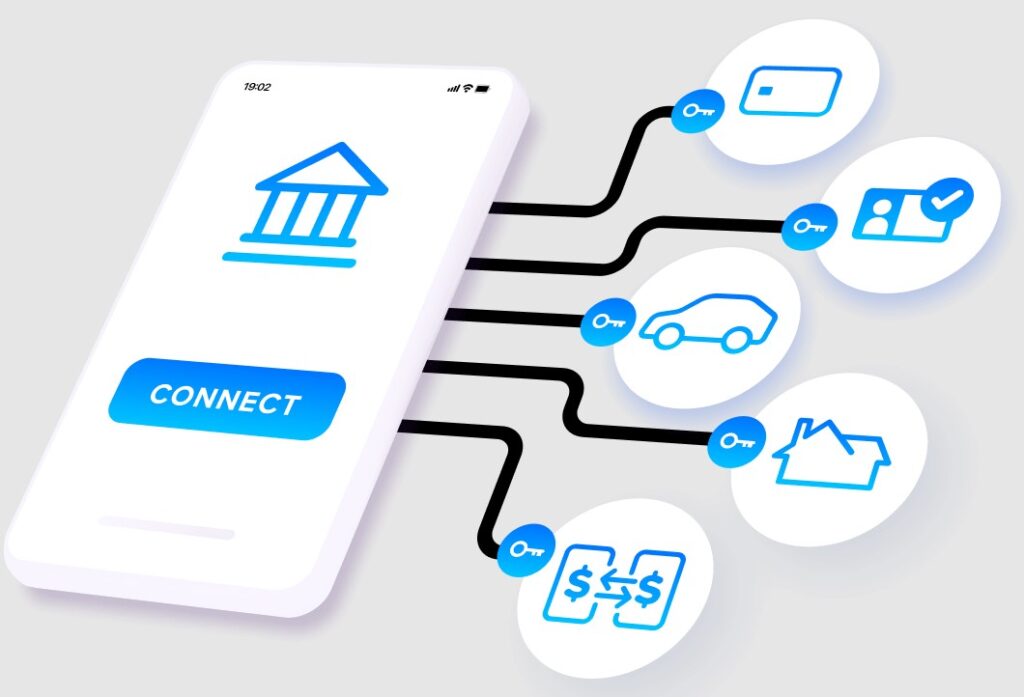
Key takeaways:
- It helps individuals and companies streamline their financial data.
- They improve transparency, security, and personalized banking experiences.
- Data has been used by financial institutions to provide better financial products.
- However, there are challenges (for example, data privacy and compatibility of APIs) that need to be handled appropriately.
- The Future of Open Banking will rely on AI-driven Financial Account Aggregators.
Open banking is changing the way consumers and businesses engage with financial institutions. Financial Account Aggregator is an essential part of this transformation, providing access to all your different financial accounts, a one-stop shop for management, and a paper trail in one place.
It provides customers with a secure way to share their banking, investment, loan, and credit card data across multiple financial institutions that help them make smarter financial decisions and offer customized banking experiences.
But what do aggregators do, and why are they so critical to Open Banking? Let’s get into what they are, how they help, and their effect on the future of financial services.
Table of Contents
What is a Financial Account Aggregator?

Source: mx.com
Financial Account Aggregator (FAA) is a turnaround platform or service that collects financial data from several accounts and establishments into a single dashboard. This also means users can get a more holistic view of their financial health without logging onto multiple banking apps.
How Do Financial Account Aggregators Operate?
- Consumer consent – Customers give the aggregator permission to access their finance data.
- Data aggregation — The aggregator collects data from several banks, investment companies, and credit and insurance agencies.
- Secure data sharing – One main feature of Open Banking regulations is how data is shared using APIs (Application Programming Interfaces).
- Financial insights & analysis – Users get insights into their spending, savings, loans, and investments through the aggregator.
By aggregating financial data from various platforms, Financial Account Aggregators project a unified view of a user’s finances, enabling informed financial decisions and better financial planning.
Financial Account Aggregators in Open Banking

Source: gi-de.com
The principle of Open Banking is that financial data should be open, safe, and under the user’s control. To bridge the gap between banks, fintech companies, and consumers, Financial Account Aggregators are enabling:
Integration for Financial Institutions Made Easy
➡ Users can connect their bank accounts, credit cards, investment portfolios, and loans in one interface.
➡ Aggregators use APIs and data-sharing access to create seamless and real-time access to financial data.
Enhanced Financial Visibility & Budgeting
➡ Users receive improved insights on what they spent, what they paid on loans, and how well their investments have performed by consolidating account information.
➡ Aggregated data can be used by businesses and financial advisors to provide tailored financial advice.
Improved Security & Data Control for the Client
➡ Open Banking and Financial Account Aggregators allow customers to share their data at will, unlike the traditional way of banking, where the customer data is stored in silos.
➡ All sensitive financial information is protected by strong security measures, including encryption and two-factor authentication.
More Personalized Financial Products and Services
➡ By analyzing aggregated data, banks & fintech companies can create custom financial products, improve interest rates & offer budgeting applications.
➡ Example ─ Multiple loans for a user based on their financial data to get focused AI-driven recommendations for loan & debt consolidation.
More Competition & Innovation in the Financial Industry
➡ Open Banking and Financial Account Aggregators promote healthy competition between banks and fintech companies.
➡ This creates better customer service, lower fees, and more innovative financial products.
A delightful convergence of Financial Account Aggregators in open banking gives customers complete control over their financial data while allowing financial institutions to build better solutions for the end customer.
What Are the Key Benefits of Financial Account Aggregators?

Source: qonto.com
- Simplified finance management ─ Users don’t have to log into multiple banking and investment platforms — all are available in one place.
- Improved budgeting & expense tracking ─ Aggregators analyze spending patterns and assist users with budgeting and cutting unnecessary expenses.
- Loans approved faster & more secure ─ Lenders can evaluate the financial histories of potential clients in the blink of an eye and without waiting for physical paperwork, resulting in faster loan approvals.
- More intelligent investment & saving strategies ─ Aggregators assist with investment performance analysis and offer better financial planning strategies.
- Decreased level of fraud & errors ─ Real-time access to financial data makes it easier for users to identify unauthorized transactions and suspicious behavior.
These benefits are transforming the way consumers and businesses engage with financial data through Financial Account Aggregators.
Challenges in Account Aggregation for the Financial Industry
Although Financial Account Aggregators come with numerous benefits, they also have their share of challenges:
➡ Data Privacy & Security Risks
Financial data sharing needs strong encryption and must comply with regulations (e.g. GDPR, PSD2). The JSON feeds are protected by a token-based takeover system, allowing only trusted aggregators with restricted and secure APIs to use them.
➡ Financial Institutions Compatibility Issues
API standardization is not a common practice across banks and financial institutions. Open Banking regulates financial institutions to pursue a common API level.
➡ Customer Trust & Adoption
This is because most users are reluctant to communicate banking information over third-party software. Moreover, banks and fintech firms need to educate consumers about security, transparency, and benefits.
The solution is named Financial Account Aggregator, which needs to resolve these challenges.
The Future of Financial Account Aggregators in Open Banking

Source: snabfinance.com
With the evolution of Open Banking, Financial Account Aggregators will only get more powerful with:
- AI & ML integration — Smarter financial insights & predictive analytics.
- Expanded use cases – Used beyond personal finance, aggregators will assist businesses with managing multi-account financial operations.
- Global adoption – Many more countries will establish Open Banking regulations, making it easier to share financial data across borders.
Whether it is businesses, banks, or consumers, Financial Account Aggregation will provide a relatively connected, and transparent, as well as efficient financial ecosystem.
Final Thoughts
Open Banking revolution is enabled via Financial Account Aggregators, which help seamlessly access the financial data of consumers and businesses with security. These aggregators help users gain better financial insights, improved budgeting, and more informed decision-making by integrating multiple accounts into a single platform.
At Tasks Expert, we specialize in helping businesses and individuals find the best Financial Account Aggregators that align with their needs. Whether you’re looking to simplify financial management, improve cash flow visibility, or integrate multiple accounts seamlessly, our expert virtual assistants can guide you in choosing the right solution. Ready to experience smarter financial management?







